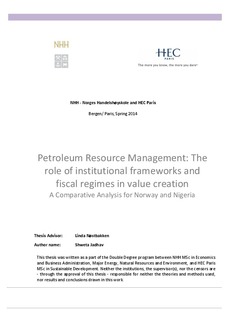Petroleum resource management: The role of institutional frameworks and fiscal regimes in value creation : a comparative analysis for Norway and Nigeria
Abstract
The p
etroleum industry plays a big role in the economy of oil
-
exporting countries
such as
Norway and Nigeria
. So while the countries depend on their petroleum
resource to literally
“
fuel the economy
”
, studies have shown that macroeconomic
activity and
fluctuati
ons
in oil prices are not significantly linked and thus do not
completely describe the sector’s performance. It is therefore that
other
factor
s, such as
the design of the institutional frameworks,
could be
instrumental in driving the
sector’s performance a
nd creating value. As studies in resource management point to
an institutional dimension, this paper explores the role of institutional frameworks
as
well as
fiscal regimes in deriving value from the petroleum resources for Norway and
Nigeria respectively.
The countries are chosen because they share similarities in the
origins of their petroleum in
dustries but
have since taken different
paths
to exhibit
diverse petroleum sector performance.
The paper studies the factors that create, affect and negate value
creation for Norway
and Nigeria in a qualitative sense to restrict the scope of the paper.
The paper presents
a comparative study of gauging the factor
s
for each co
untry in its respective context
of creating value in the petroleum industry.
